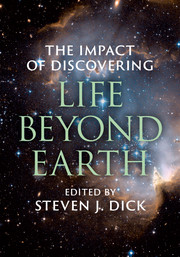Book contents
- Frontmatter
- Dedication
- Contents
- List of contributors
- Introduction: Astrobiology and society
- Part I Motivations and approaches: How do we frame the problems of discovery and impact?
- Part II Transcending anthropocentrism: How do we move beyond our own preconceptions of life, intelligence, and culture?
- Part III Philosophical, theological, and moral impact: How do we comprehend the cultural challenges raised by discovery?
- Part IV Practical considerations: how should society prepare for discovery – and non-discovery?
- Contributor biographies
- Index
- References
Part IV - Practical considerations: how should society prepare for discovery – and non-discovery?
Published online by Cambridge University Press: 05 November 2015
- Frontmatter
- Dedication
- Contents
- List of contributors
- Introduction: Astrobiology and society
- Part I Motivations and approaches: How do we frame the problems of discovery and impact?
- Part II Transcending anthropocentrism: How do we move beyond our own preconceptions of life, intelligence, and culture?
- Part III Philosophical, theological, and moral impact: How do we comprehend the cultural challenges raised by discovery?
- Part IV Practical considerations: how should society prepare for discovery – and non-discovery?
- Contributor biographies
- Index
- References
Summary
Introduction
Over the past several decades sporadic attention has been given to the impact of discovering life beyond Earth, beginning with NASA's “Cultural Aspects of SETI” workshops in the early 1990s and extending to meetings sponsored by institutions as diverse as the Templeton Foundation, the Foundation for the Future, the American Association for the Advancement of Science, and the Royal Society of London (see Dick 2012, p. 917, for an overview and references). These meetings only partially dealt with practical steps to prepare for such a discovery. Here we enter the policy arena, and not just in a theoretical way. During Congressional hearings on astrobiology held in 2013 and 2014, members of Congress wanted to know “What should we do if life is found beyond Earth”? (US Congress 2013 and 2014). This is a policy question with no agreed-upon answers at this time. Discussions such as those found throughout this volume are essential background to decisions that will inevitably have to be made in the event of discovery. This section continues that discussion, but also attempts to tackle policy problems more directly, both from the point of view of approaches and practical steps.
If we are going to discuss policy at the interface of astrobiology and society, it would seem prudent to ask what lessons can be learned from the approaches, issues, and answers provided in previous endeavors such as the Human Genome Project, or in biology and society programs that exist at several universities around the world. In the opening chapter of this section, historian of science Jane Maienschein gives us the benefit of her experience as the long-time Director of the Biology and Society program at Arizona State University. She systematically lays out the issues and urges humanistic approaches to astrobiology. An important lesson learned is that scholars from the humanities, social sciences, and other areas cannot isolate themselves in their discussions and recommendations, but must interact in a meaningful way with both scientists and policy makers. Otherwise social science deliberations will remain an academic exercise divorced from political and scientific reality. Indeed, interactions across the sciences and social sciences in the astrobiological context bid fair to serve as a leading edge of what Harvard biologist E. O. Wilson has called consilience, the unity of knowledge across the humanities, social sciences, and natural sciences (Wilson 1998; Finney 2000).
- Type
- Chapter
- Information
- The Impact of Discovering Life beyond Earth , pp. 245 - 248Publisher: Cambridge University PressPrint publication year: 2015



